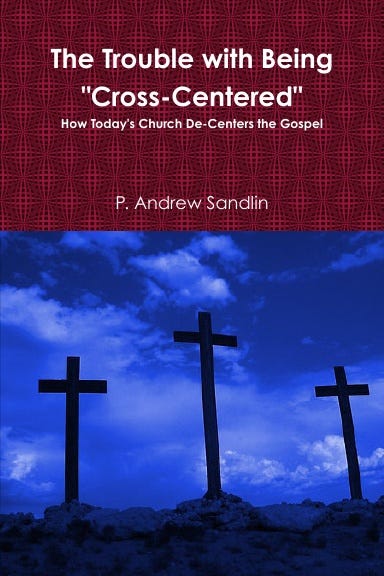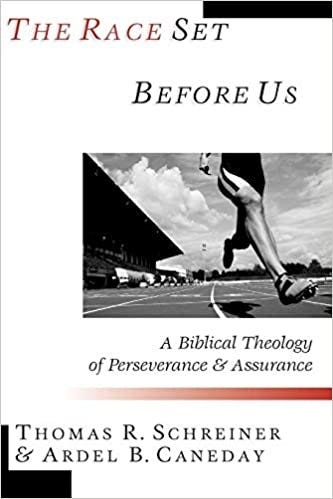
Apostasy and Assurance
If we're united to Jesus Christ, we will persevere and cannot apostatize, and we can have rock-solid assurance that we cannot.
Dear friends and supporters,
From time to time the dispute over soteric (salvation doctrine) election, apostasy, perseverance, and assurance reemerges. This age-old conundrum won’t be solved anytime soon, for one thing because we cannot, strictly speaking, solve it by exegesis (discovering the meaning of a biblical text). A definitive answer can only be obtained by a theological paradigm that takes into account and harmonizes the largest number of correctly exegeted biblical texts.
So it’s not a case of good exegesis versus bad exegesis, but an inferior theological paradigm versus a superior theological paradigm. This shows us why systematic theology is necessary. The Bible isn’t meant to be understood as a collection of comparatively diverse and unrelated statements but as a comprehensive message. Systematic theology necessitates systematic soteriology, and systematic soteriology must account for a wide range of biblical data.
Apostasy
Apostasy is defined as a total desertion of or departure from one’s religion, principles, party, cause, etc. Apostasy is a fearful possibility in the Bible. Scores of biblical texts teach this, but here I’ll mention only three of the most prominent:
For it is impossible for those who were once enlightened, and have tasted the heavenly gift, and have become partakers of the Holy Spirit, and have tasted the good word of God and the powers of the age to come, if they fall away, to renew them again to repentance, since they crucify again for themselves the Son of God, and put Him to an open shame.
For the earth which drinks in the rain that often comes upon it, and bears herbs useful for those by whom it is cultivated, receives blessing from God; but if it bears thorns and briers, it is rejected and near to being cursed, whose end is to be burned. (Heb. 6: 4–8)
Then consider 2 Peter 2:1–2,
But there were also false prophets among the [old covenant] people, even as there will be false teachers among you, who will secretly bring in destructive heresies, even denying the Lord who bought them, and bring on themselves swift destruction. And many will follow their destructive ways, because of whom the way of truth will be blasphemed.
Finally, notice at the end of the same chapter (vv. 20–22):
For if, after they [false teachers] have escaped the pollutions of the world through the knowledge of the Lord and Savior Jesus Christ, they are again entangled in them and overcome, the latter end is worse for them than the beginning. For it would have been better for them not to have known the way of righteousness, than having known it, to turn from the holy commandment delivered to them. But it has happened to them according to the true proverb: “A dog returns to his own vomit,” and, “a sow, having washed, to her wallowing in the mire.”
Clearly one can depart from following Jesus Christ, from the church, from the Christian Faith, and sadly a multitude during Christian history have done precisely that.
These apostasy texts and many others create a theological tension among Christians embracing positions known as “eternal security,” “once saved always saved,” and “the perseverance of the saints.” What the former classification of apostasy texts teaches is that one can be a Christian and believer and enjoy benefits of union with Christ’s visible body, and be the recipient of aspects of God’s grace associated with his atoning death and resurrection — and still apostatize.
This does not, however, address the question of whether Christ’s soterically elect, predestined, foreordained and justified individuals can apostatize. In other words, we must reckon with the possibility that there are two categories of Christians, believers whose eternal destinies are not identical and whose relationship to God is not (and never was) identical.
Eternality of eternal life
Certain texts teach with striking force the irrevocable, irreversible standing of Christians within God’s soterically elective purpose. Here are three noted texts expressing that truth:
First, relevant portions of Ephesians 1:3–12,
Blessed be the God and Father of our Lord Jesus Christ, who has blessed us with every spiritual blessing in the heavenly places in Christ, just as He chose us in Him before the foundation of the world, that we should be holy and without blame before Him in love, having predestined us to adoption as sons by Jesus Christ to Himself, according to the good pleasure of His will ….
In Him we have redemption through His blood, the forgiveness of sins … that in the dispensation of the fullness of the times He might gather together in one all things in Christ, both which are in heaven and which are on earth—in Him. In Him also we have obtained an inheritance, being predestined according to the purpose of Him who works all things according to the counsel of His will, that we who first trusted in Christ should be to the praise of His glory.
Then note John 6:37-40, Jesus speaking,
All that the Father gives Me will come to Me, and the one who comes to Me I will by no means cast out. For I have come down from heaven, not to do My own will, but the will of Him who sent Me. This is the will of the Father who sent Me, that of all He has given Me I should lose nothing, but should raise it up at the last day. And this is the will of Him who sent Me, that everyone who sees the Son and believes in Him may have everlasting life; and I will raise him up at the last day.”
To conclude, Philippians 1:6, “[B]eing confident of this very thing, that He who has begun a good work in you will complete it until the day of Jesus Christ.”
From these two classifications of biblical texts we can say: If we define “Christian” denotatively, “a follower of Jesus Christ,” we can say without hesitation that Christians can apostatize.
But on the strength of the second classification of passages, we can argue equally that a subset of Christians cannot apostatize. Intrinsic to this viewpoint is the understanding that Christians who later apostatize can benefit widely and deeply from God’s work in the world, including his Son’s atoning work on the cross. They can partake of the heavenly life as well as the Holy Spirit and consume the word of God and even enjoy “the powers of the age to come” — and still apostatize. John Murray writes:
The Scripture itself, therefore, leads us to the conclusion that it is possible to have very uplifting, ennobling, reforming, and exhilarating experience of the power and truth of the gospel, to come into such close contact with the supernatural forces which are operative and in God’s kingdom of grace that those forces produce effects in us which to human observation are hardly distinguishable from those produced by God’s regenerating and sanctifying grace and yet not be partakers of Christ and heirs of eternal life.
This is a testimony to the overwhelming power of the gospel and God’s work in the world. It can have a deep and broad impact even on those who are not elect or justified.
(continued below)
This book shows (1) that it is un-Biblical to be Cross-centered, (2) that grace without obedience is not true grace, and (3) that godly criticism of ungodliness does not undermine grace.
Get the e-book here.
(continued)
Justification or condemnation
That final word might be the most pivotal in this entire discussion. Whatever benefits Christians who later apostatize receive, one that they cannot have received is justification? Why?
First, what is justification? (See “Why Justification?”) It is a judicial verdict of acquittal, of “not guilty.” It is the opposite of condemnation, which is the imputation of sin, or a verdict of “guilty.”
Justification is not the new birth or moral renovation. It is true that those justified are also regenerate and gradually renovated from their sinful condition. This is included in the process of sanctification. But this is not justification.
Justification or condemnation concerns one’s standing before God: either right with God, or not right with God, respectively. The justified are right with God; the condemned are not right with God.
Justification in the world religions
It is a central Pauline tenet we are justified not by works, but by faith (Rom. 4). This distinctive marks Christianity off from all other world religions, including apostate Judaism. Virtually every religion features a justification of some sort, whatever it might be called. All of them believe in reconciling man’s immorality before a moral God.
For almost all of them but Christianity, this immorality of the present life is settled exclusively at the consummation (end of history), at the final judgment. Often it’s thought that the individual’s good works will be weighed against his bad works, and if the good works outweigh the bad, he’ll be justified, and if the bad outweigh the good, he’ll be condemned.
In principle, this is also the biblical view, but there is a crucial, additional element.
Justification in Christianity (… and in history)
Because the Bible teaches that man is so sinful that he cannot save himself, if he is to be justified in the end, he must be justified by something other than his own efforts, or good works. This is why Christ came, to bear the penalty for our sin and act righteously, and his righteousness is credited (a biblical term is “imputed”) on the basis not of works, but of faith, whole-hearted, submissive trust in the Lord Jesus (see Rom. 3:21—4:8).
It is here that the most distinctive element of all enters the picture. The Bible teaches that sinners can be justified before the consummation. Justification occurs not only at the end of history but, also, and more remarkably, in the middle of history. When we trust in Jesus Christ, we are at that point justified, judicially and irrevocably declared righteous. This is the historic Protestant view. In the words of Richard B. Gaffin, Jr.,
[T]he Reformers came to understand that, in effect, the verdict [of justification] belonging at the end of history, had been brought forward and already pronounced on believers in history, and so constituted the certain and stable basis for the Christian life and unshakable confidence in the face of the final judgment.
This justification is a final, definitive, irreversible declaration. Think only of its obverse, condemnation. At the end of history when all unbelievers stand before the awesome judgment throne of God, they will be condemned for their sin and unbelief and consigned to hell. That condemnation is final, definitive, and irreversible. No orthodox Christian ever would suggest that God could at some subsequent point reverse this tragic eternal verdict.
But if this is true of condemnation at the end of history, it is equally true of justification during history.
A reversible justification is not justification. It’s a contradiction in terms. Justification is an end-of-the-world decree occurring long before the end of the world.
The soteric fait accompli
This helps to explain a remarkable statement in Romans chapter 8, which was written largely to provide assurance to the justified. Paul writes (vv. 29-30):
For whom He foreknew, He also predestined to be conformed to the image of His Son, that He might be the firstborn among many brethren. Moreover whom He predestined, these He also called; whom He called, these He also justified; and whom He justified, these He also glorified.
Paul is laying out an unbreakable soteric chain, beginning with election and ending with glorification, which is the final resurrected state of the redeemed. The reason he can speak of glorification as though it were a past fact is because it’s simply the final, splendorous link in the chain that simply cannot be broken at any point. Up to the expression “called,” everything is past to our own present existence.
But Paul doesn’t stop there. He moves all the way to glorification, the final conformity to Christ‘s image in our resurrected state.
Paul, under the Spirit’s inspiration, can write from the standpoint of the eternal God for whom our entire salvation is a fait accompli, not just because he foresees the future but also because union with the risen Lord by faith alone secures the entire soteric chain.
This means that the justified can never apostatize any more than the soterically predestined could (they are, in fact, the same people). The gift of eternal life is eternal life, not temporary life.
To deny perseverance is to deny justification
To say that apostasy is a possibility for every Christian is simply to say that no Christian can be justified, but to say that no Christian can be justified is to completely overturn Pauline — biblical — soteriology.
Consider the implications for what we today call “eternal security,” “once saved always saved,” and “the perseverance of the saints.”
The elect/called/justified among the wider body of Christians cannot apostatize, because eternal life assures perseverance in the Faith. This is why “perseverance of the saints” is an apt expression; we don’t believe in the perseverance of sinners. We persevere in righteousness. There is no room for antinomianism: “I’m eternally secure, so I’m free to live any way I want.” No elect/called/justified person would (or could) think this way.
When, therefore, we observe an apostate, we’re not observing an elect/called/justified Christian. Why? Because perseverance is a gift of eternal life just as justification and glorification are, and it would be impossible without them.
Therefore, to this point I’ve coined the clunky moniker “elect/called/justified.” I could have as easily used the clunkier, but more accurate, “elect/called/justified/glorified.” Biblical soteriology necessitates this unbreakable chain. One link presupposes the entire chain tying us unalterably to Jesus Christ
The eternal versus the historical context
Why, therefore, are there so many warnings to persevere and to avoid apostasy? Simply because the Bible is not written only to the elect/called/justified, but to all Christians, to the church. The church is a visible body, visibly united to Christ, visibly committed to the triune God. This doesn’t imply either (a) that every single Christian possesses eternal life, or (b) that every single Christian can apostatize. It assumes that the Bible is not a narrow book written to only one classification within the church — any more than the Hebrew Scriptures were written only to the believing Jewish remnant rather than to the entire covenanted nation (see Heb. 4:1–2; 1 Cor. 10:1–22).
This is why M. F. Sadler is correct to point out that Paul not once instructed deeply sinful church members to “get saved” but, rather, to return to the living God. The Bible is written by an eternal God but from within the historical, covenantal context.
The gift of assurance as a gift of eternal life
A related but separate question is whether assurance of eternal life is possible. We know that it’s possible, because the Bible is written partly to provide that assurance (1 Jn. 5:13). Indeed, we might say that the epistle of 1 John is written almost entirely to provide that assurance.
Those who are clinging tenaciously to Jesus Christ for eternal life and whose faith is manifested in the Spirit’s operation, including good works, enjoy the gift of assurance.
William Cunningham disclosed that the early Reformers believed that assurance of eternal life is one gift itself of eternal life, while subsequent generations lost this bold confidence. I believe the original Reformers were right. The elect/called/justified can (and do) enjoy rock-solid certainty that they are what they are: elect/called/justified, and soon-to-be glorified. We can know that we have eternal life, not simply hope or surmise that we do.
No individual, however, who is not clinging by faith to Jesus Christ and is not manifesting the life of submissive obedience may have assurance of eternal life. For him, the dire warnings of apostasy are a haunting prospect.
This also might lead us to consider whether Christians who persistently doubt their salvation are, in fact, elect/called/justified. False assurance even at the final judgment is a tragic reality (Mt. 7:15–23), but recurring lack of assurance is not a mark of the justified.
Those who believe that apostasy is a genuine possibility for every single Christian subsume eternal election into God’s covenant operation within history. Many who recognize God’s eternal election of individuals, on the other hand, submerge God’s covenant historical work into his eternal work.
Both are mistaken.
The warnings of apostasy to the wide body of all Christians are genuine, while among this wide body of Christians, the elect/called/justified will irreversibly persevere.
Conclusion
In many ways the truth of justification is the hinge on which all of this turns, but it is equally important to say that this means that the entire soteric chain becomes ours by union with the risen Lord by faith alone — if we’re united to Jesus Christ, we will persevere and cannot apostatize, and we can have rock-solid assurance that we cannot.
This synthesis of biblical truth (systematic soteriology) prevents soteric presumption on the one hand and anxiety on the other.
Will you consider a tax-deductible donation to CCL via PayPal or Venmo? Or mail a check to CCL, Box 100, Coulterville, CA 95311. God uses you to keep us going — and expanding.
Personal
Tomorrow Sharon and I head out to northern Alabama for the For God and Truth Conference (Pastor Ernie Yarbrough) on August 4–7.
I’ll be staying over on Sunday, August 8, to preach at Trinity Free Presbyterian Church.
I’ll also be delivering two intimate-venue talks on “The High Cost of Low Expectation,” one in the Birmingham, Alabama area (Sunday, August 1) as well as the northern Tennessee area (Monday, August 9). These talks are by invitation only, so please contact me if you’re interested in attending.
The CultureChange e-newsletters the next few weeks will be briefer than normal since we’re on the road and so busy with lectures, preaching, and meeting so many people (some of you!).
I thank God for each of you friends and supporters.
Yours for in full assurance,
Founder & President, Center for Cultural Leadership
One of the best books on perseverance and assurance you’ll ever read is by CCL’s Senior Fellow of New Testament Theology, Ardel Caneday and Thomas Schreiner: The Race Set Before Us: A Biblical Theology of Perseverance & Assurance.
More great stuff:
The Center for Cultural Leadership site is here.
My Amazon author page (print and digital) is here.
You can find my sermons and lectures at my YouTube channel.
Sign up to get my blog updates here.
Here’s my Twitter feed.
If you want to get the free exclusive hard copy publication Christian Culture, please send me a Facebook private message.
The CCL phone number is 831-420-7230.
The mailing address is:
Center for Cultural Leadership
P.O Box 100
Coulterville, CA 95311











